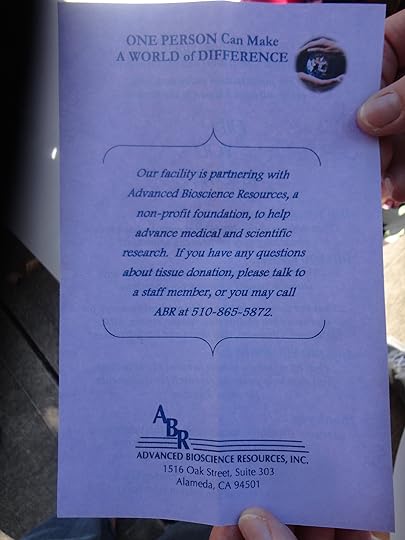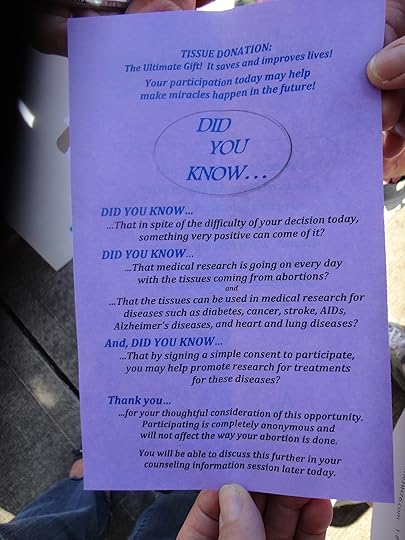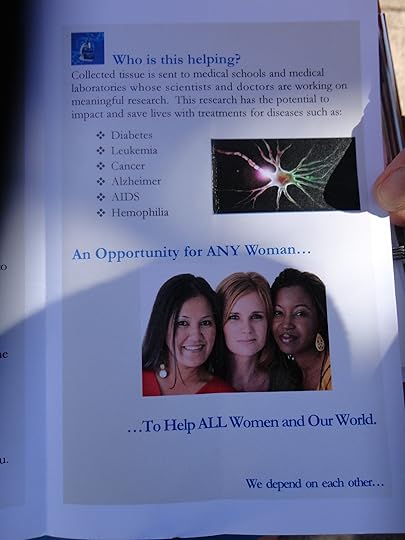Randy Alcorn's Blog, page 158
October 21, 2015
A 13-Year-Old Reader’s Review of My Graphic Novel The Apostle
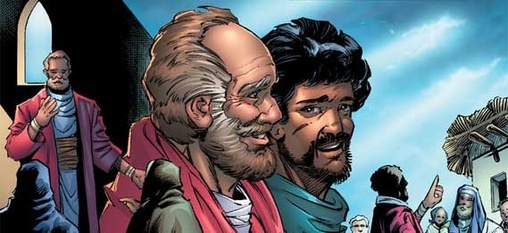
Last year I shared a review of my graphic novel Eternity, written by (then) 12-year-old Katie, who reviews books on her blog. She recently reviewed my latest graphic novel The Apostle. (Thanks, Katie!)
Recently I read the graphic novel The Apostle by Randy Alcorn. I found it to be very well written, with amazing illustrations. This book centers on Paul’s life, following him from the stoning of Stephen until his death. I’ve read these stories before, but they always seemed like individual journal entries, loosely tied together. As I read The Apostle, I began to see how the accounts in Acts are part of a bigger, better story - God’s story.
By using Luke as a narrator, Mr. Alcorn gives a glimpse of how difficult it was for the church to accept Saul at first. The death of Stephen still echoed in their minds. The only things Saul had brought to them before had been misery, death, and imprisonment. And yet - this was who God had chosen. He was chosen to live and die for Jesus, bring God’s Word to thousands of people, and write many books of the New Testament.
I loved this book, and will definitely be reading it again! It is very well written, and stays true to scripture. Better yet, it very clearly presents the gospel throughout the book. In short, this is a great book, and I highly recommend it.
I’m always encouraged to see young people reading and evaluating Christ-centered books and literature!
Note from EPM: If you’d like to get an early start on buying Christmas gifts for the young readers on your list, Randy’s graphic novels Eternity and The Apostle are both on sale for $8 each (53% off $16.99 retail) through today, Wednesday, October 21 at 4 p.m. PT.
October 19, 2015
Baby Body Parts Confirmed as Being Sold for Profit by Private Abortion Clinic in My Home State
In my own home state of Oregon, a prolife organization has confirmed that it’s not just Planned Parenthood that’s selling baby body parts for medical research, but also a private abortion clinic in Portland. Recently, one of the women who was there for a late-term abortion gave the prolifers outside some information that directly tied the clinic to Advanced Bioscience Resources, the same company noted in the Center for Medical Progress videos as buying the body parts of babies from Planned Parenthood.
Click each photo to see the larger image.
Notice the irony of the statement on their promotional materials: “One person can make a world of difference.” Yet the personhood of unborn children is completely ignored. Personhood isn’t something to be bestowed on human beings by Ivy League professors (Princeton’s bioethics prof Peter Singer comes to mind) intent on ridding society of “undesirables.” Personhood has an inherent value that comes from being a member of the human race. According to the Bible, this is part of being created in God’s image.
The materials also claim “tissue” donation is “An opportunity for ANY woman to help ALL women and our world.” But what about the fact that half (and in some places, more) of all aborted babies are female? To kill an unborn female is to kill a young woman. To sell off her body parts is to exploit a young woman. There can be no equal rights for all women until there are equal rights for unborn women.
October 16, 2015
My Little Book God’s Promise of Happiness, Plus a Giveaway from EPM

Along with my book Happiness, a new beautiful little book called God’s Promise of Happiness was just released, which is a simplified and differently presented version of the big book. (It has 13,000 words and 96 pages.) It’s designed for believers who want an introduction to the topic, but don’t have the time or inclination to engage the larger work. God’s Promise of Happiness is also written for unbelievers who are interested in the subject and will be drawn to the Gospel as “good news of happiness” (Isaiah 52:7, ESV). I believe its pocket size and the question and answer format will make it a helpful tool in sharing the Gospel of Christ. In that sense, it’s sort of the happiness equivalent of my Heaven booklet.
Hope you enjoy the excerpt below, and you can also read a longer PDF excerpt to get a feel for how the book is laid out. I pray that God will use God’s Promise of Happiness for the glory of Jesus and the good of His bride.
IS IT OKAY FOR CHRISTIANS TO BE HAPPY?
Shout triumphantly to the Lord, all the earth! Be happy! Rejoice out loud! (Psalm 98: 4, CEB)
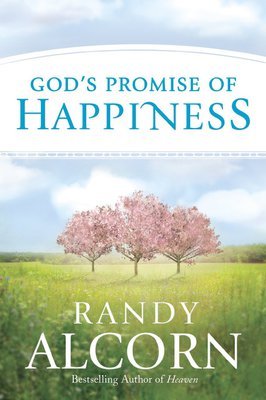 It’s not just okay to be happy; it’s right to be happy. The Bible clearly tells God’s children to be happy. Jesus commanded his disciples to be happy, and for a compelling reason: “Rejoice that your names are written in heaven” (Luke 10:20). If we’re not experiencing happiness in God, then we’re disobeying and missing the abundant life Jesus came to give (see John 10:10).
It’s not just okay to be happy; it’s right to be happy. The Bible clearly tells God’s children to be happy. Jesus commanded his disciples to be happy, and for a compelling reason: “Rejoice that your names are written in heaven” (Luke 10:20). If we’re not experiencing happiness in God, then we’re disobeying and missing the abundant life Jesus came to give (see John 10:10).
We shouldn’t criticize people for wanting to be happy. Pastors who encourage people to stop seeking happiness or parents who don’t want their children motivated by happiness are fighting a losing battle. They’ll never succeed, and they’ll do damage by distancing the gospel from the happiness everyone craves.
Consistently seeking our happiness in Jesus shouts to everyone that God is present and working in the world and that he’ll one day reign over a new universe. As A. W. Tozer said, “The people of God ought to be the happiest people in all the wide world!” [i]
Be happy and shout to God who makes us strong! (Psalm 81:1, CEV)
Always be full of joy in the Lord. I say it again—rejoice! (Philippians 4:4, NLT)
DOES THE BIBLE HAVE MUCH TO SAY ABOUT HAPPINESS?
There are more than 2,700 passages in the Bible containing words such as joy, happiness, gladness, merriment, pleasure, cheer, laughter, delight, jubilation, feasting, exultation, and celebration.
God makes it clear that seeking happiness through sin is wrong and fruitless. But seeking happiness in him is good and right:
Happy are you, O Israel! Who is like you, a people saved by the Lord! (Deuteronomy 33:29)
Be happy and excited! You will have a great reward in heaven. (Matthew 5:12, CEV)
Many passages don’t contain the word happiness, but the concept is unmistakable:
May Yahweh bless you and protect you; may Yahweh make His face shine on you and be gracious to you; may Yahweh look with favor on you and give you peace. (Numbers 6:24-26, HCSB)
All the days of the afflicted are evil, but the cheerful of heart has a continual feast. (Proverbs 15:15)
Enjoy life with the wife whom you love. (Ecclesiastes 9:9)
DOESN’T THE BIBLE TALK ABOUT JOY RATHER THAN HAPPINESS?
An ungrounded separation of joy from happiness has infiltrated the Christian community. Among English speakers, the word happiness has been a bridge between the church and the world, until recently. It’s a bridge we can’t afford to burn. Joy is a perfectly good word. But there are other equally good words that Bible translators use to convey happiness, including gladness, merriment, delight, and pleasure.
Happiness and joy are synonyms. They’re much more alike than unalike. Joy, in Merriam- Webster’s dictionary, is defined as “a feeling of great happiness” and “a source or cause of great happiness.” [ii]
Similarly, look in Hebrew and Greek lexicons at the many different words translated joyful, glad, merry, and delighted. In nearly every case, you’ll find these words defined as meaning “happy.”
Think of expressions using the word joy:
“He jumped for joy.”
“She’s our pride and joy.”
“I wept for joy.”
In each case, isn’t joy synonymous with happiness?
John Piper writes, “If you have nice little categories for ‘joy is what Christians have’ and ‘happiness is what the world has,’ you can scrap those when you go to the Bible, because the Bible is indiscriminate in its uses of the language of happiness and joy and contentment and satisfaction.” [iii]
You, O Lord, have made me happy by your work. I will sing for joy because of what you have done. (Psalm 92:4, NET)
God, you have caused the nation to grow and made the people happy. And they have shown their happiness to you, like the joy during harvest time. (Isaiah 9:3, NCV)
Enter to win 1 of 10 pairs of God’s Promise of Happiness (one for you, one to give away) from EPM:
[i] A. W. Tozer, Who Put Jesus on the Cross? (Camp Hill, PA: WingSpread, 2009), e-book.
[ii] Merriam-Webster Unabridged Dictionary (Britannica Digital Learning, 2014), s.v. “joy,” http://www.merriam-webster.com/dictio...
[iii] John Piper, “Let Your Passion Be Single,” Desiring God, November 12, 1999.
October 14, 2015
Carly Fiorina’s Comments and the Footage of an Aborted Child: Was It Real?
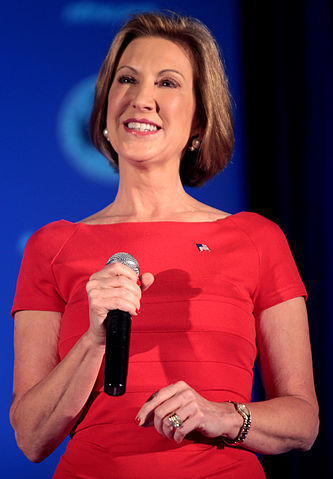 Note from Randy: Please understand that what follows is not intended as an endorsement for Carly Fiorina or anyone else. However, my position has long been, and still is, that I will not vote for any candidate of any party who defends the freedom to kill innocent unborn children. (Also, please note a graphic picture of the results of abortion is included in this blog.)
Note from Randy: Please understand that what follows is not intended as an endorsement for Carly Fiorina or anyone else. However, my position has long been, and still is, that I will not vote for any candidate of any party who defends the freedom to kill innocent unborn children. (Also, please note a graphic picture of the results of abortion is included in this blog.)
Republican presidential candidate Carly Fiorina ignited a firestorm when at CNN’s Republican primary debate last month she challenged President Obama and Hillary Clinton to watch the Center for Medical Progress (CMP) video exposés on Planned Parenthood and referred to a specific part of one of the videos:
“Watch a fully formed fetus on the table, its heart beating, its legs kicking, while someone says, ‘We have to keep it alive to harvest its brain.’ This is about the character of our nation, and if we will not stand up and force President Obama to veto this [Planned Parenthood defunding] bill, shame on us.”
Following the debate, the media claimed her comments were false, there was no such video, or the video portrayed a miscarriage, and not an abortion. So were they correct?
No! The CMP video did include real footage of a still-alive aborted baby, which was provided by the Center of Bio-Ethical Reform, a prolife advocacy group. (The picture below shows that the baby in the Center for Medical Progress footage is the same child in the video from the Center for Bio-Ethical Reform.)
Gregg Cunningham, executive director of the Center for Bio-Ethical Reform, explains:
Ms. Fiorina was referring to a Center for Bio-Ethical Reform (CBR) video depicting a few seconds of a 17 1/2 week fetus, still alive and moving, following an intact-delivery abortion. Here we post the entire unedited video. The total running time is approximately 13 minutes and the video is in five segments as the camera operator turns the camera on and off.
CBR and the Center for Medical Progress (CMP), in whose undercover Planned Parenthood investigative video the CBR abortion footage appears, have been falsely accused of misrepresenting a miscarriage as an abortion. The first segment of the unedited video depicts the abortion itself, with the baby delivered alive and struggling in the abortionist’s gloved hand. Segments 2 and 3 depict the baby still moving in a stainless steel pan after repeatedly being handled abusively by the abortionist. Segments 4 and 5 are static gynecological shots of the baby’s mother.
This unedited version of the disputed footage proves incontestably that this termination is an abortion. Mothers at risk of miscarriage present at hospitals, not abortion clinics. Hospitals are in the business of sustaining pregnancies and saving babies. Abortion clinics are in the business of terminating pregnancies and killing babies. This video depicts a termination and the subsequent abuse and neglect of a preemie obviously delivered alive. No attempt is made to provide the neonatal intensive care a hospital would extend to a wanted baby. It is possible that the abortionists performing this termination violated both state and federal law by withholding care from a baby who survived an abortion.
Ms. Fiorina made reference to a baby’s heart still beating while its brain was being harvested (a process which Planned Parenthood’s senior director of medical services calls “digging”) and a former StemExpress “procurement technician” says, “I’m sitting here and I’m looking at this fetus and its heart is beating, and I don’t know what to think” (National Review, August 19, 2015). The article adds that “… her StemExpress supervisor instructed her to cut through the face of the fetus in order to get the brain.”
The unedited version of the abortion depicts an intact-delivery termination and Planned Parenthood partner StemExpress admits through its CEO (Cate Dyer), “Oh yeah, if you had intact cases, which we’ve done a lot, we sometimes ship those back to our lab in its entirety …” (The Daily Signal, August 21, 2015).
A World Magazine article, August 19, 2015, describes “… an aborted baby’s beating heart, a post-abortion occurrence that’s not uncommon, according to Ben Van Handel, executive director of Novogenix Laboratories.”
Ms. Fiorina’s characterizations are not hyperbole.
The terms of our abortion clinic access agreements explicitly forbid us from disclosing any information which could identify the abortion providers from whose clinics we obtain imagery. Dates, locations, affiliations and staff and patient information are confidential. Violating these prohibitions could subject CBR to legal liability and jeopardize clinic access for current and future projects. We are even obligated to delete the audio track on all of our videos.
Gregg provided further rebuttal of the false claim that the video depicts a miscarriage:
Medical malpractice lawsuits have become so common that OB/GYNs practice defensive medicine. They protect themselves by over-diagnosing, over-treating and over-prescribing. No doctor delivering this baby as a preemie in a hospital would fail to provide neonatal intensive care. Even if he had no compassion for the baby or his parents, he would provide care to avoid being sued for negligence. Warren Hern, in his book "Abortion Practice" warns of the difficulty in estimating fetal ages. A baby moving as vigorously as this one is presumptively entitled to care and would receive it—unless the attending physician is an abortionist, which is the case here.
Miscarried embryos and fetuses are virtually all still births involving a baby who expired in the uterus and was later born dead. A preemie in a hospital is born alive and given intensive care—not slapped around in a pan as happened here with a baby who survived the abortion depicted at the beginning of the video.
It’s worth saying that Carly Fiorina’s comments about the video could use further clarification:
Carly Fiorina appears to have conflated the video of the fetus with the story [of harvesting an aborted child’s brain] being told by O’Donnell [the former StemExpress “procurement technician”] at the same time. It’s fair to say Fiorina’s description was incorrect to the degree it treated both incidents as relating to one fetus; however, both the brain harvesting incident and the video of a fully formed, kicking fetus are real. [i]
I’m grateful for those, including Carly Fiorina, who are speaking up for the unborn (Proverbs 31:8-9) even when it’s unpopular to do so. May we continue to do likewise.
[i] 'Carly Fiorina Was Right': Group Releases Full Abortion Video Mentioned in GOP Debate
Photo credits: "Carly Fiorina by Gage Skidmore 3" by Gage Skidmore. Licensed under CC BY-SA 3.0 via Commons. | Video image comparison
October 12, 2015
Joy Forney on Finding and Being Community

Joy Hlavka Forney and her husband Dave, along with their children, serve with Mission Aviation Fellowship in Uganda, East Africa. Joy grew up at our church, Good Shepherd Community Church, along with her sisters and our daughters. I served for years with Joy’s dad Alan, one of our pastors, and more recently our lead pastor. The Forneys are quality people and in this article Joy said things that really resonate with me. This is church in its simplest and most precious form. Thanks, Joy:
True community. We all crave it, but it can be so difficult to find, can’t it?!
We sat on wooden benches creaking under our weight. The music blaring next door ringing in our ears. Several different languages spoken all under one roof with names like Luganda and Acholi. One translator for all of us.
I sat on the floor, dusty with red dirt, in my sweet spot, with the kids.
It started as a Christmas gift to my friend Chaundra, who dreamed up a space where we could meet as families of kids with special needs. She decided to build community and invited me to join in, and here we are, month by month, meeting together.
A foot brace squeaks and creaks as we play. My little boy, Giftie, finding his spot in the group, a place to belong for a boy who is deaf and has cerebral palsy.
We gathered. We weren’t sure what exactly it was going to look like, we just knew that we wanted a safe place, a place for the people to come and be filled, encouraged.
The Ugandan pastor and his church body showed us the way. The way to love, give, serve and build community. These saints traveled on foot to tell each of the families about our gathering, since most had no phone. They lovingly cooked the food and made sure each family had transportation money.
Humbled by the turnout, I nervously bit my lip and wondered if everyone was disappointed.
We brought a speech therapist, nurses, a prayer warrior, and us fellow mamas to special needs kids to encourage.
One family, with their sweet son, traveled by bus 8 hours just to be a part of the group. I felt bad.
You came all this way for this? We don’t have much.
A meal and some encouragement was our simple offering, and still they came.
One girl with hydrocephalis, many with cerebral palsy, children with burns, autism, deaf, mute.
All are welcome to our gathering. We are in this together.
Come, sit. Belong.
Let’s eat together, share stories, and come away refreshed for the difficult weeks ahead.
I leaned over to our friend, a Ugandan nurse. I told her I felt bad and she looked at me, confused.
“Why?”
I explained we didn’t have much to offer, much for them to do or take away.
Still confused, she spoke true, “These people are just happy to find a community, to belong, and see other people walking their same road. This gives them hope.“
Hope and Community.
Long after I figured it was time to go, they lingered. Not saying much, simply sitting and enjoying.
To be with all the others. To know you aren’t alone. To look around and see your people. That is enough.
How many times when offering something, hospitality, friendship, do I think I have to clean it up, prettify it, offer something spectacular, when all I need to offer is community?
To sit, in the dirty, dusty, mess of it all and offer the hope of knowing we are in this together?
“And they devoted themselves to the apostles’ teaching and the fellowship, to the breaking of bread and the prayers. And awe came upon every soul, and many wonders and signs were being done through the apostles. And all who believed were together and had all things in common. And they were selling their possessions and belongings and distributing the proceeds to all, as any had need. And day by day, attending the temple together and breaking bread in their homes, they received their food with glad and generous hearts, …” Acts 2:42-47 ESV
It is what we all crave. To belong. To be seen. To be understood.
I hear from a lot of women, wishing they had community.
My best advice? Create it. Find those who need a friend, who need to belong, and give them the gift of community with you.
Who in your life needs the gift of community, the gift of hope today?
Reach out to them. Text them, call them, invite them.
Give them the gift of hope and community.
October 9, 2015
Happiness Webcast and Recap of the #Happinessbook Twitter Chat
Hope you enjoy watching the webcast video below, and also reading through the recap of the #Happinessbook Twitter chat that took place last week. (If Twitter is your thing, I invite you to follow me there. You can also join me on Facebook, where I regularly post thoughts, Christ-centered quotes, Scriptures, and occasional pictures of my grandkids and our dog Maggie.)
If you're reading this blog by email, see the browser version to watch the video and read the full chat recap.
I’m live for next 60 minutes answering questions. Ask yours with #Happinessbook and follow at http://t.co/vM3Fiwwi24
— Randy Alcorn (@randyalcorn) September 30, 2015
.@KLWetherell Use examples of suffering believers happy in Jesus. Paul says Rejoice in the Lord always. Sorrow & joy coexist. #Happinessbook
— Randy Alcorn (@randyalcorn) September 30, 2015
.@mariaeriksens There are many, one 1 Thess. 5:16-18 "Rejoice always, pray continually, give thanks in all circumstances." #happinessbook
— Randy Alcorn (@randyalcorn) September 30, 2015
.@maggierowe With a smile & a sense of peace & pleasure in Christ. Even when we deal with tough issues, maybe especially then #happinessbook
— Randy Alcorn (@randyalcorn) September 30, 2015
.@dukeslee Oswald Chambers, who I love, was the first I found to speak critically about happiness and make it opposed to joy #happinessbook
— Randy Alcorn (@randyalcorn) September 30, 2015
.@caroltraver All God's image bearers have some happiness. God "satisfies your hearts with food & happiness" (Acts 14:17) #happinessbook
— Randy Alcorn (@randyalcorn) September 30, 2015
.@mariaeriksens Show Jesus & Paul in multiple passages, include 2 Cor 12:9, 3X prayed to be delivered God didn't but gave joy #happinessbook
— Randy Alcorn (@randyalcorn) September 30, 2015
.@SonKing I'm sure it did, they had delight in all creation, food, animals, water, trees, etc., all from God. He is primary. #happinessbook
— Randy Alcorn (@randyalcorn) September 30, 2015
.@maggierowe See celebration in Deut 12 and 14:24-26, where God commands his people to eat and drink whatever they crave, ESV #happinessbook
— Randy Alcorn (@randyalcorn) September 30, 2015
.@KJ__Miller @maggierowe Yes, I quote that from Lewis, and a lot more from him too! Great insights on happiness from him. #happinessbook
— Randy Alcorn (@randyalcorn) September 30, 2015
.@jbegits It's the universal longing, behind everyone's thoughts & actions, when we seek happiness in Christ all changes. #happinessbook
— Randy Alcorn (@randyalcorn) September 30, 2015
.@maggierowe Abosolutely. Hebrews 1:9 is emphatic, Jesus the happiest person there is, have two chapters on Jesus' gladness #happinessbook
— Randy Alcorn (@randyalcorn) September 30, 2015
.@SonKing Yes, I cite Piper 15 times in book, gave it to him when we were speaking together few days ago. Desiring God great! #happinessbook
— Randy Alcorn (@randyalcorn) September 30, 2015
.@KJ__Miller Saying thank you, connection between thanksgiving & joy throughout Scripture. Time in Word (Psalm 19:8, GNT) #happinessbook
— Randy Alcorn (@randyalcorn) September 30, 2015
.@jdkearnsak In book I argue that this distinction between joy & happiness is recent and not based in Bible or church history #happinessbook
— Randy Alcorn (@randyalcorn) September 30, 2015
.@KylarNicholasGr See Rev 21:24, nations & kings on new earth, all in submission to King of kings, Jesus. Flags? Possible. #happinessbook
— Randy Alcorn (@randyalcorn) September 30, 2015
.@RandyAlston No, if you check Hebrew & Greek lexicons, original words for joy, happiness, gladness are all close synonyms. #happinessbook
— Randy Alcorn (@randyalcorn) September 30, 2015
.@dukeslee Jonathan Edwards (and lots of Puritans I cite), Spurgeon, and today, Piper. #happinessbook
— Randy Alcorn (@randyalcorn) September 30, 2015
.@EStephenBurnett @TGC Don't think the speculation ever contradicts Bible, imagination based on revealed texts as pastors do #happinessbook
— Randy Alcorn (@randyalcorn) September 30, 2015
Thanks to all who joined #Happinessbook! @epmorg will post a recap on my blog soon. See http://t.co/qoXRYeWo6O for more resources.
— Randy Alcorn (@randyalcorn) September 30, 2015
October 7, 2015
A Tribute to My Friend, John Kohlenberger
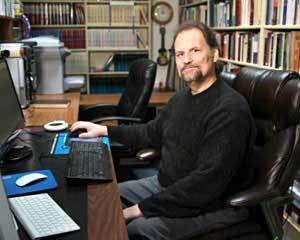 I’m writing an unusually long blog in honor of an old and precious friend.
I’m writing an unusually long blog in honor of an old and precious friend.
On September 29, 2015 John R Kohlenberger III went home to be with Jesus, after a thirteen-year battle with cancer.
John, a gifted scholar, wrote many biblical language reference works. (To get a sense of his academic accomplishments, see this page).
When he was first diagnosed, John wasn’t expected to live more than a few years. But God gave him thirteen. They weren’t easy on him or his family, but God used them for great good.
John and I met when we were both very young Christians. He told me he was afraid that because he’d done drugs before his conversion, his mind might be permanently damaged. Since he became one of the greatest intellects I’ve known, and a world-class expert in Hebrew and Greek, I used to kid him that if his mind was damaged I’d hate to have seen it undamaged!
One time when John shared his powerful testimony of being reached by the grace of Jesus, a young man said to him, “I wish I had your testimony.” John told him, “No you don’t.” He wanted people to trust Jesus without making the choices Jesus delivered him from. Since we’d both grown up in homes without Christ, we used to tell our friends to be grateful they grew up in Christian families.
Because he was an accomplished guitar player, I asked John to lead music in a Junior High Group I was leading in 1973. It was fun working together, and soon I was asking John to teach the group. John and I went through Bible college and seminary together, talking and praying and reading and discussing God’s Word. It was my privilege to be best man at his wedding, and he was one of my groomsmen. That was forty years ago. While in seminary, we’d have marathon ping pong games as we talked about Scripture and life. John and I enjoyed each other’s humor, and we kidded each other as the best of friends do.
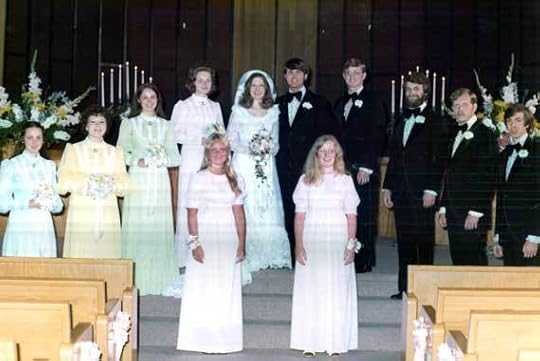
Nanci's and my wedding. The second guy from me is John Kohlenberger, the second gal from Nanci is John’s wife Carolyn.
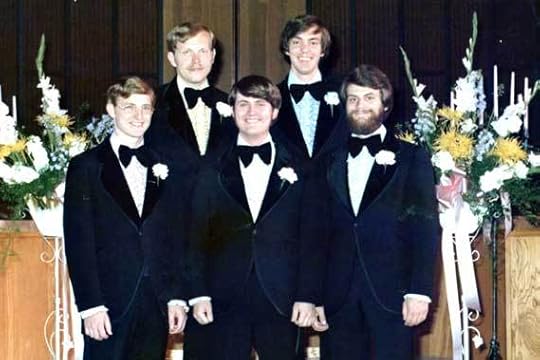
My groomsmen, with John at the lower right. May 31, 1975 On my other side is Jerry Hardin, who I’ve written of elsewhere.
If you’re older, you know how it goes—life changes, you get busy with your kids and work and you end up in different churches, and then you don’t spend as much time with some of your old friends as you used to. Over a period of years where John and I didn’t see much of each other, we would connect most summers at the Christian Booksellers Convention (now ICRS), where we would walk the floor together. We’d make smart-aleck comments and inside jokes at some of the odd things displayed at the convention, introduce each other to friends, catch up and tell stories and reminisce. We would laugh and laugh.
At one convention, John asked me to go with him to a private luncheon honoring John Stott. John was invited, and at his request, I crashed the party. John and I were the only guys there not in coat and tie, neither of us was even close, especially me. But John Stott, a British pastor-scholar full of grace, shook our hands and spoke with us nonetheless, something we both treasured.
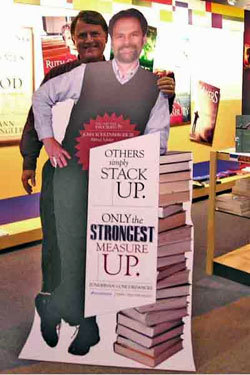 Years later, when John K. couldn’t make it to ICRS, I sent him this photo from the floor. We had a good laugh. I told John it was much cheaper for his publisher to make a cardboard image of him and ship it to the convention than to send him. It was a treat to pose with cardboard JRKIII.
Years later, when John K. couldn’t make it to ICRS, I sent him this photo from the floor. We had a good laugh. I told John it was much cheaper for his publisher to make a cardboard image of him and ship it to the convention than to send him. It was a treat to pose with cardboard JRKIII.
Another year when John couldn’t be there because of health, I called him and we talked for an hour and a half as I described what was going on there and who said to say hi to him. It didn’t seem right to be at the convention without him present.
Even when our contact was once a year, my heart was always strong for John, I rejoiced to see and hear his name and learn of his accomplishments. Thinking of him always brought a smile to my face.
While John was fighting cancer, we joined him and Carolyn in their home, and had a wonderful time with them and his friends from church who served with him on the worship team. Seeing their love for him and his for them was really moving.
About ten years ago Nanci and I went to a Passover dinner beautifully conducted by John at Powell Valley Covenant Church, the church we’d attended many years earlier, where Nanci and I grew up, where Carolyn and I came to Christ, and John helped me work with Junior High kids. What a wonderful evening.
I walked miles with John at some cancer Relays for Life, one of which he personally walked over 26 miles. I saw repeatedly his warm interactions with many people he’d come to know through his disease. I saw how his daughter Sarah and son Josh loved and supported their dad. Carolyn told Nanci last week how close John was to his granddaughters, and that four-year-old Ella was really going to miss him.
Relay for Life
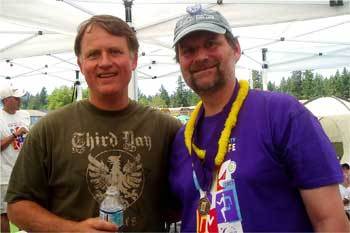
I’ll never forget a lunch in Gresham in John’s honor, perhaps eight years ago, where we were joined by three of our old friends, Larry Gadbaugh, Jim Swanson and Mike Petersen. Larry, also one of my groomsmen and in the photo above, met John before he came to Christ, and couldn’t get over the transformation. Jim worked with John on various original language projects with Ed Goodrick, our old Greek teacher from Multnomah Bible College. Mike saw John daily for years when JRKIII worked in an office on the Petersen property. The five of us enjoyed a wonderful meal, full of grace and truth and laughter. John gave us various books he’d produced over the years. It was so rich.
Every time I exchanged emails with John asking him about Hebrew and Greek issues, the benefit wasn’t just the excellent info, but touching base with my friend. Seeing the presence of Jesus in his life really inspired me.
John and his family lived an amazing journey these last thirteen years. Carolyn stood by him and supported him, as did Sarah and Josh, in beautiful ways. John told me that while he’d kept himself away from people in the past, suddenly with his diagnosis he found himself constantly in doctors’ offices, hospitals, experimental treatment programs, and support groups, and gathering with people at his church.
John and I shared the lessons of life we’d each learned from our adversity, mine the lesser ones of insulin-dependent diabetes, abortion clinic lawsuits and job loss; his the greater one, of facing the prostate cancer that finally took his life.
We discussed that we’re going to live forever. So why wouldn’t we live each day in light of the world to come? Both of us wanted to spend a good deal of the rest of our lives here passing on to others what we learned.
We’d both become more acutely aware than ever that every day is a gift and an opportunity, that our days are numbered. And God has a purpose in them. We discussed how we don’t have to feel desperate about the fact that we’re going to die someday—we are going to live forever! We encouraged each other to use our remaining time here to do what will make a difference for eternity. We talked about Heaven and the New Earth, and more recently talked about finding happiness in Christ.
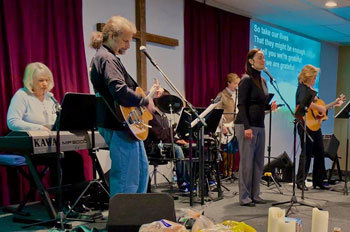 By dealing with his cancer, John told me he learned to be authentic and honest. “It’s much easier for me now to touch someone I don’t know and pray for them,” he said. John reached out to others in need and found it rewarding. And though years earlier he could never have imagined such a thing, this lifelong scholar, once with reclusive inclinations, said to me, “You know what I’d really enjoy doing? Becoming a chaplain and helping people deal with cancer.”
By dealing with his cancer, John told me he learned to be authentic and honest. “It’s much easier for me now to touch someone I don’t know and pray for them,” he said. John reached out to others in need and found it rewarding. And though years earlier he could never have imagined such a thing, this lifelong scholar, once with reclusive inclinations, said to me, “You know what I’d really enjoy doing? Becoming a chaplain and helping people deal with cancer.”
John is in the acknowledgments of my new book Happiness—he, along with his friend and mine Jim Swanson, was a big help with the original languages. Little did I know that the book would come out two days before his death.
John and Carolyn Kohlenberger were among those to whom I dedicated my book If God Is Good. In that book, with his permission, I told his story of what he had learned in his suffering. That doesn’t minimize or glorify my friend’s pain, or his family’s, but it does show some of God’s purpose in it (see 2 Corinthians 1:3–7).
John shared with me some wonderful words he wrote about suffering, which I saved. I was deeply touched, and still am, as I read them:
Not just putting on a brave face.
I wish I went through the last six years again. I see the good that has happened.
The growth in relationship I wouldn’t have known.
The perspective and how hard life was—not the luxury of being able to be contemplative.
We either party or we whine.
Had to deal with evil and suffering with people of privilege who have.
I would sound more authentic than before.
Perfectionistic father, not measure up, worthless well, why me? No, who cares?
John’s perspective no longer brutal.
I don’t believe God is any less good than I did before.
It’s much easier for me now to touch someone I don’t know and pray for them.
Chaplain-esque. Wanting to help people now.
Do I do long-term planning? Or not?
Narcissism fighting, it’s not all about me.
Health and wealth gospel is a pyramid scheme that feeds the prosperity of those at the top.
God will turn the pyramid on its head.
John was and is a unique soul, different than any person I’ve ever known. There was in him, at times, a pain and sadness, and a self-doubt that some people didn’t understand. But I knew him as far more than a scholar or brilliant intellect. He was a brother with an immense capacity for humor and enjoyment. He had a relational warmth we enjoyed together, as he did with those who knew him best. As our mutual friend Mike Petersen said, “I’m really going to miss that brother.” Me too.
While I mourn for his dear family, including his grandchildren, I am thrilled for him that he is now experiencing unbridled delight—he has entered into his Master’s happiness.
I love you, John, my brother and friend. I look forward to joining you in the presence of our Savior, and walking the New Earth together!
Randy Alcorn
Here’s a touching seven-minute video of the Kohlenberger family as they battled cancer and grew close to one another.
Here’s a tribute to John by Stan Gundry, who knew John and his remarkable gifts, and worked with him in publishing.
October 5, 2015
As a Single Person, Will I Be Second Class in Heaven?

Today’s blog contains a wonderful answer by EPM staffer, Karen Coleman, a veteran missionary to Cameroon who now works with us in Oregon.
The question came from a reader. Whether you’re single or married, her helpful response is well worth reading through.
Someone wrote EPM:
As a middle aged, never-married, Christian single with no kids, life is lonely. No matter how many people I try to befriend, my social circle necessarily shrinks over time. People marry. I move. Relationships change.
How will I fare in Heaven when surrounded by mostly large families where people have their kids, grandkids, many friends, a spouse, etc., and I'm alone?
There is a de facto caste system in the church today of: marrieds with children, remarried with children or blended, divorced with kids, divorced with no kids, and on the lowest “caste,” the dreaded single. It seems as though we’re always second class in the church.
How will singles not be treated as second rate and ostracized when surrounded by large families in eternity?
Here’s Karen’s reply:
Thanks for your thoughtful questions.
The de facto caste system that you mention cannot exist in Heaven. The sadness of loneliness cannot exist in Heaven. Randy believes what the Bible clearly teaches: that there will be ONE family and ONE marriage—with Christ as the Groom and all believers, His Church, as the Bride.
God has very happy plans for you on the New Earth, as Randy explains in his video, “Will our relationships we have now continue in Heaven?”:
“We’ll meet many new friends, people that we haven’t known in this life…you may not yet have met the closest friend you will have ever have, the closest brother or sister as part of the family of God may be somebody that you won’t meet until you’re sitting at a dinner table, with Christ who’s in charge of the seating arrangements in the New Heavens and the New Earth, and there’s this great banquet where people come from the East and West…”
Just imagine that! Christ knows you inside and out. He knows the loneliness you’ve experienced. He knows you don’t have family here. He will be your loving Father and you will be His beloved child. And He is planning happiness and laughter and friends for you that will amaze and delight you for all eternity! Trust Him for that, because it’s the truth.
Please take the time to watch this video, by Randy’s former research assistant Julia Stager. She starts talking about marriage, but at the end Julia addresses singleness and the very issues you raise.
As Julia states, “Singleness can be extremely painful. But it’s not eternal and it’s not wasted. Single people aren’t single because there’s something wrong with them, or because God has forgotten about them. This life…will never be ultimately satisfying, and that’s the way it should be. Whether married or single, what we all truly long for is the perfect marriage between Christ and His people.”
Here is another video by Julia about singleness that could be very pertinent.
I have now been single for about 2/3 of my 60 years. I’ve spent a lot of time meditating on 1 Corinthians 7:32-35:
“I want you to be free from anxieties. The unmarried man is anxious about the things of the Lord, how to please the Lord. But the married man is anxious about worldly things, how to please his wife, and his interests are divided. And the unmarried or betrothed woman is anxious about the things of the Lord, how to be holy in body and spirit. But the married woman is anxious about worldly things, how to please her husband. I say this for your own benefit, not to lay any restraint upon you, but to promote good order and to secure your undivided devotion to the Lord.”
If anyone is second rate here (and I don’t believe that’s what Paul is saying), it is married people! I would encourage you to memorize those verses and spend time mulling them over and over in your mind. What does it really mean to “be anxious about the things of the Lord, how to please the Lord” and to have “undivided devotion to the Lord”? How could you use your singleness now to further God’s Kingdom?
I would also encourage you to find a good church with a home Bible study or Sunday school class that’s a mixture of marrieds and singles that accept both equally, encouraging growth and fellowship together.
You may already be doing this, so I don’t want to assume anything. But one help with loneliness is to volunteer places or look for ways to help others. There are so many lonely people, especially in care centers, for example, who would love to have someone to talk to. Perhaps God has given you extra time to reach out to others since you know what loneliness is like.
I don’t know if you like music, but here’s a song that has encouraged me when I’ve felt extreme loneliness, “He Knows” by Jeremy Camp.
How will you fare in Heaven? You will be eternally happy with more deep, true friends than you could ever count, part of God’s forever family, one of His well-loved children. I’m praying for you to really grasp the truth of the goodness that God has in store for you!
October 2, 2015
Reviewers Respond to My New Book Happiness, Plus EPM Giving Away 10 Copies

Reviews of my new book Happiness are coming in. After three years of researching and writing this book, it’s fun and encouraging to see readers’ responses. Very grateful! Below are a few excerpts from some of those reviews. Also, Eternal Perspective Ministries is giving away 10 signed copies of the book. —Randy Alcorn
I’ve started working my way through Randy Alcorn’s massive new tome Happiness. It’s a thoroughly biblical treatment of an important subject.
…The book does a great job of dispelling some common myths about happiness. Alcorn argues there is no real biblical difference between happiness and joy. He writes, “Only in recent times have happiness and joy been set in contrast with each other. I believe this is biblically and historically ungrounded and has significant downsides.” Which leads to another common misunderstanding: the notion God is concerned about our holiness, not our happiness, or that the two are somehow opposed to each other. Simply not true, says Alcorn. And he backs it up with plenty of biblical evidence.
…Reading Happiness has been, so far, a happy experience itself. I think every Christian could benefit from its lessons.
A landmark book on happiness in the Christian’s life, language, and theology from @randyalcorn. pic.twitter.com/MgXUcemzw7
— Tony Reinke (@TonyReinke) September 14, 2015
(Listed on Tony’s 50 Best Books of 2015.)
Tony Reinke said it perfectly—Randy Alcorn’s new book, Happiness, is a “200,000-word encyclopedia on joy.” Its 450-plus pages present the most comprehensive Christian treatment of happiness I know, resulting in one of the most enjoyable, exciting, and exuberant books of theology I’ve read in a long time. It’s one of those rare, potentially life-changing books that has the ability to positively transform our view of God, the Bible, the world, and the Christian life.
…for its positive effect on my own soul, for its capacity to radically transform Christians’ lives, and for its potential to improve the church’s evangelistic message, Happiness is my 2015 book of the year, and I pray God will make it the most-read and happiest “encyclopedia” ever published.
— David Murray, The Gospel Coalition
Pastor Alcorn isn't content just to tell us to be happy. He insists on searching Scripture and showing us the Gospel-centered reasons for a happy life. And if you trust him for a few hundred pages, he'll convince you that there's a lot of happiness to be found, first in God Himself, then in the gifts He gives us, and in our response to God and His world.
I really enjoyed reading this book. (Frankly, if a book called "Happiness" wasn't a pleasure to read, wouldn't that be a major problem right there?) …Also, as you're sitting there holding a thick book with "Happiness" emblazoned on the cover, you may have somebody come up and ask you what you're reading. Won't it knock their socks off when you tell them? Now that's a way to start a Christ-conversation, with happiness.
— TheophilusFarrell4, Amazon reviewer
Enter to win 1 of 10 signed copies of Happiness from EPM
September 30, 2015
What My New Book Happiness Is and Isn’t About
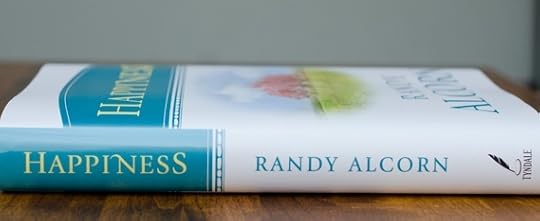
I invite you to join me today, Wednesday, September 30, for a webcast and live Twitter chat at 2:30 p.m. EST/11:30 a.m. PST. I'll be sharing about my study of Happiness. After the webcast, you can join the Twitter chat using the hashtag #happinessbook. (You can watch the chat even if you don't have a Twitter account.) View the webcast and chat during the event at www.happinessandheaven.com.
I spent the last three years researching and writing on a biblical view of happiness. It was a lot of work, but also an eye-opening and happy-making experience as I examined the often-neglected truth that though the present world involves much evil and suffering, nonetheless God calls us to find pleasure and delight in him.
I’m happy to tell you that Happiness has now been released. My prayer is that God would use this book to draw readers to Jesus and help them gain a deeper understanding of the “good news of happiness” (Isaiah 52:7).
In the book’s introduction, I share how I first heard about Christ as a teenager, visiting a church youth group. Initially, Bible stories seemed to me like the Greek mythology and comics I loved. Then I read the Gospels, and I came to believe that Jesus was real, and superheroes are his shadows. I felt a profound happiness I’d never known.
My heartfelt gladness was the result of being born again, forgiven, and indwelt by God’s Spirit. This “joy of your salvation” (Psalm 51:12) stood in stark contrast to the emptiness I’d felt before hearing the gospel’s “good news of great joy” (Luke 2:10). My parents immediately noticed the change. (Mom liked it; Dad didn’t.)
I never considered the things I gave up to follow Christ as sacrifices—mainly because they hadn’t brought me real happiness. My worst days as a believer seemed better than my best days before knowing Christ. Jesus meant everything to me. I wasn’t attempting to be happy; I simply was happy.
Having known Jesus for more than four decades now, I realize that my story isn’t universal. Not everyone who comes to Christ experiences the dramatic increase in happiness that I did. Many do, but some see that happiness gradually fade.
Nothing is more annoying than reading a book by a naturally gleeful person who’s a cheerleader for happiness. I’ve known a few people with perpetually sunny dispositions, but my own nature is reflective and, at times, melancholic. I’ve experienced seasons of depression, both before and since coming to faith in Christ—some due to my personality type and emotional makeup (and perhaps genetics), some triggered by my long-term physical illness (insulin-dependent diabetes), and some the result of adverse circumstances.
I’m no stranger to unhappiness—in this world under the curse of evil and suffering, something would be wrong if I were. I’ve researched the Holocaust, walked through the Killing Fields of Cambodia, written at length on persecution and the problem of evil and suffering, and have walked alongside people who have experienced profound tragedy and grief. In short, I’d be the last person to write a breezy book on happiness that ignores life’s difficulties and denies the struggles of living in a fallen world. But by God’s grace, as the years have passed, I’ve experienced a more consistent heartfelt gladness and delight in Christ. That—not perpetual and unsustainable ecstasy—is what my book is about.
Rest assured, Happiness is not about pasting on a false smile in the midst of heartache. It’s about discovering a reasonable, attainable, and delightful happiness in Christ that transcends difficult circumstances. This vision is realistic because it’s built on God’s all-encompassing sovereignty, love, goodness, grace, gladness, and redemptive purposes in our lives.
Until Christ completely cures us and this world, our happiness will be punctuated by times of great sorrow. But that doesn’t mean we can’t be predominantly happy in Christ. Being happy as the norm rather than the exception is not wishful thinking. It’s based on solid facts: God secured our eternal happiness through a cross and an empty tomb. He is with us and in us right this moment. And he tells us to be happy in him.
“Positive thinking” says we can always be happy if we look on the bright side and don’t deal with negative things (such as sin, suffering, judgment, and Hell). I don’t believe that. Nor do I embrace the God-as-genie prosperity gospel preached by name-it-and-claim-it folks, which promises happiness through perpetual health, wealth, and success—if only we muster enough faith.
This health-and-wealth philosophy isn’t unique to Christians. In The Secret, Rhonda Byrne tells about Colin, a ten-year-old boy who was dismayed by long waits for rides at Disney World. He’d seen The Secret movie, so he focused on the thought that tomorrow he wouldn’t have to wait in line. What happened? Colin’s family was chosen to be Epcot’s “First Family” for the day, putting them first in every line.[i]
Of course, we should be grateful when God sends us fun surprises. But it’s one thing to be happy when such things occur and another to expect, demand, or lay claim to them. Our models should be people such as Amy Carmichael (1867–1951), who brought the gospel to countless children she rescued from temple prostitution in India. She experienced a great deal of physical suffering and never had a furlough in her fifty-five years as a missionary. Yet she wrote, “There is nothing dreary and doubtful about [life]. It is meant to be continually joyful. . . . We are called to a settled happiness in the Lord whose joy is our strength.”[ii]
This book is about the surprising “settled happiness” that God makes possible despite life’s difficulties. Rich and durable, this happiness is ours today because Christ is here; it’s ours tomorrow because Christ will be there; and it’s ours forever because he will never leave us. What I’m writing of is not a superficial “don’t worry, be happy” philosophy that ignores human suffering. The day hasn’t yet come when God will “wipe away every tear from [his children’s] eyes” (Revelation 21:4). But it will come. And this reality has breathtaking implications for our present happiness.
Continue reading the introduction to the book.
[i] Rhonda Byrne, The Secret (New York: Atria Books, 2006), 88.
[ii] Frank Houghton, Amy Carmichael of Dohnavur (Fort Washington, PA: CLC Publications, 1953), chapter 25.

